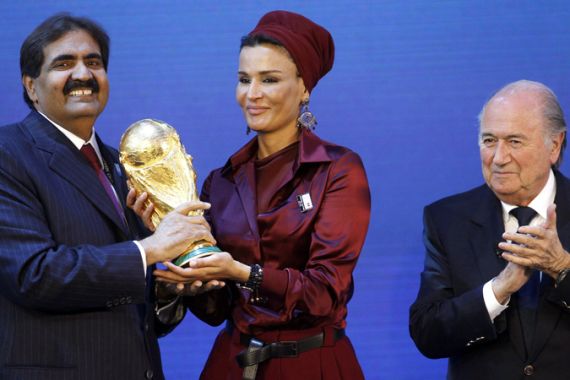Qatar promises labour reform before 2022
Head of organising committee pledges international labour standards will be met as Gulf state prepares for tournament.

Qatar 2022 World Cup organisers will ensure contractors adhere to international labour laws at construction projects before the tournament, the head of the event’s organising committee has said.
Hassan al-Thawadi, the Qatar 2022 general secretary, said on Tuesday that progress was being made on the labour front.
“Major sporting events shed a spotlight on conditions in countries,” al-Thawadi said, adding: “There are labour issues here in the country, but Qatar is committed to reform.”
“We will require that contractors impose a clause to ensure that international labour standards are met … Sport, and football in particular, is a very powerful force. Certainly we can use it for the benefit of the region.”
Poor working conditions are common across the oil-rich Gulf region, where impoverished men and women from South Asia have come for decades to toil on construction sites or to work as domestic help.
‘Inhuman’ conditions
Conditions on building sites in Qatar had been described as “inhuman” last year by the International Trade Union Confederation (ITUC), which wants world football’s governing body, FIFA, to ensure that standards are met for migrant workers.
In November, the ITUC and other groups met with FIFA’s general secretary to inform him that they would hold a campaign in opposition to the 2022 World Cup being held in Qatar unless the country improved working conditions.
At the time, ITUC chair Sharan Burow said the organisation would “not accept people working to build stadiums without respect for workers’ rights”.
Labour advocates also say the sponsorship system, in place across much of the Gulf – and the lack of a minimum wage – allow migrant workers to be exploited.
All foreign workers in the region must work for a local sponsor, and it is legally difficult to leave the sponsor before an employment contract ends without the sponsor’s consent. Many sponsors keep their workers’ passports.
Massive building effort
Qatar has embarked on a massive domestic building programme in the run-up to the tournament. It is spending $11bn on a new international airport, $5.5bn on a deep-water seaport and $1bn for a transport corridor in the capital, Doha. It will also spend $20 billion on roads.
A management contract to oversee construction projects for the 2022 tournament would be awarded in the first quarter of this year, Thawadi said.
“It will be in the first quarter, definitely. [The programme manager] will ensure the infrastructure projects are delivered on time, and that there is a contingency plan in place in case of a delay,” Thawadi said.
The contract, originally expected to be awarded late last year, will oversee co-ordination with government agencies on large infrastructure projects, including the construction of stadiums, on which the country plans to spend $4bn.
Qatar has said it will build nine new stadiums and renovate three existing facilities.
A construction industry source told the Reuters news agency in October that more than six companies were vying for the contract, including British construction consultants Arup, Mace and Turner International.
Samir Aita, editor of Le Monde Diplomatique‘s Arabic edition, told Al Jazeera that the World Cup would “shed light on Qatar and all Gulf countries, since all reports say they are not respecting basic human, social and economic rights”.
“When the same person is a minister and the president of a company, can a worker go to the minster and ask him to sue the company?” he asked. “This doesn’t work.”
“This occasion of the games could be a good step [if] Qatari people and Qatari authorities respond point-by-point to [International Labour Organisation] demands,” Aita said.